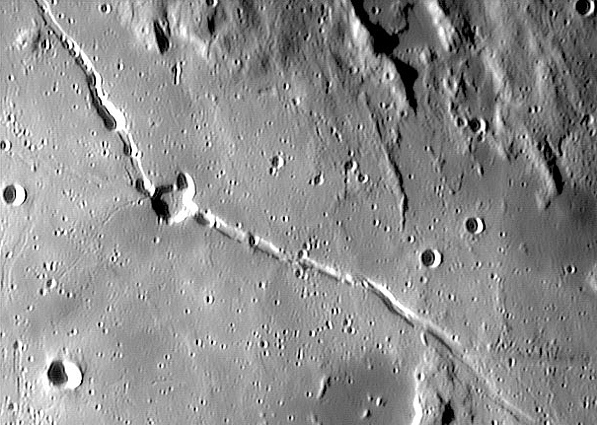Difference between revisions of "February 25, 2015"
(Created page with "__NOTOC__ =Say Hi to Hyginus= Originally published February 25, 2004 <!-- Start of content --> <table width="640" border="0" align="center" cellpadding="6" cellspacing="2"> <...") |
(No difference)
|
Latest revision as of 00:04, 25 February 2015
Say Hi to Hyginus
Originally published February 25, 2004
Image Credit: Bruno Daversin |
|
Say Hi to Hyginus Each new high quality image of the Moon reveals things we may have overlooked before. This excellent image of Hyginus and its rille taken with the Ludiver 24" telescope shows features that are rarely imaged from the Earth. Hygenus is one of the largest craters on the Moon NOT likely to be of impact origin. Nine-kilometer wide Hyginus has no rim and is at the bottom of a 100 km wide, 1.5 km deep depression. The key to understanding the origin of Hyginus is probably the small pit craters visible in the rille on the northwest (left) side of Hyginus. These pits almost certainly formed by collapse of the roof over a lava tube. Such features occur on the flanks of shield volcanoes in Hawaii. There may have been an explosive phase associated with the collapse formation of Hyginus based on the dark annulus that surrounds it. This material - pyroclastic? - is slightly visible here and is well seen at full Moon. This Ludiver image also show a narrow rille on the southeast side of Hyginus; another thin rille is visible at the bottom right. A number of broader floor rilles are mutedly visible as if they have been partially covered by later material. Finally, another apparent dome - unkown? - with crater pit appears on the right center edge. And is that another pancake dome (20 km wide) at the end of the thin rille southeast of Hyginus? Can anyone say the Moon is not full of surprises? Technical Details: Related Links: Yesterday's LPOD: An Amateur's Moon Tomorrow's LPOD: On the Moon with Apollo 15 |
|
Author & Editor: |
COMMENTS?
Register, Log in, and join in the comments.




